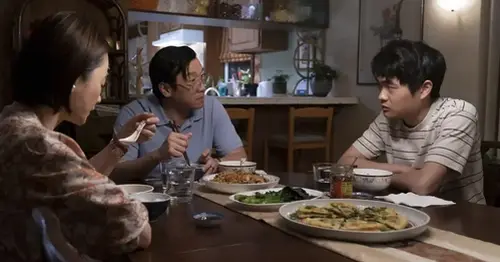
'American Born Chinese' producers discuss the 'next phase' of on-screen diversity
In the upcoming Disney+ series “American Born Chinese,” angsty teen Jin secludes himself in his room, covers his ears and attempts to muffle the sharp sound of his immigrant parents quarreling in Chinese.
“There was a conversation early on, and not in a bad way, about whether or not the parents should be happier in their marriage. And we stuck to our guns,” creator and executive producer Kelvin Yu said. “Of course, they love each other. But they’re having a hard time, just like their sons having a hard time.”
While it may seem like an uncomfortable moment, particularly for a family show, Yu said they didn’t want to bury an honest portrayal of an Asian immigrant family. Through the series — which announced this week that it will premiere on May 24 — the producers hope to expand on the image of Asian family dynamics, which are oftentimes tense due to the mental toll of immigration.
The real, raw relationships in the show, Yu said, are an example of how diverse stories are evolving and will continue to expand the emotions and experiences displayed on screen.
“I think we’re in the next phase, which is to make the characters more human,” he said.
The series, based on a 2006 graphic novel of the same name by author and show executive producer Gene Luen Yang, follows Jin as he contends with the hormonal throes of adolescence. Though Jin, played by Ben Wang, is already preoccupied with making the soccer team, navigating an overall social unease, and managing the ways in which his teen life collides with his immigrant family, he’s thrown into further chaos when he’s unknowingly thrust into a battle of Chinese mythological gods.
The show has several eye-opening elements, from its use of traditional Chinese lore, to a star-studded cast that includes Oscar winners Michelle Yeoh and Ke Huy Quan. But “American Born Chinese” also stands out for its depiction of the strained relationship between Jin’s parents. Not only do they fail to be united in their views on their son’s life path, with Jin’s mother wanting him to follow his heart, and his father encouraging him to tread safer, more stable waters; their own conflict seems to be a particularly stressful one.
The producers said they drew from real-life observations of how the pressure of survival and confusion in the U.S. can weigh on otherwise loving relationships.
“There’s a lot of values that you take from your own upbringing, in your own culture, and you come to a new place, and things don’t line up and make sense the way they make sense where you come from,” Yu said. “Suddenly, you’re left to figure out what works and what doesn’t … For me, that was the tension in my family. How do you do the ‘American’ thing?”
Both Yu and Yang said that the family show leans into the melancholia of adolescence for a reason. Making impactful art, they said, isn’t just about basic representation, but also complicating the narratives that have come before it. And oftentimes, that means delving into some darker material in a nuanced way.






